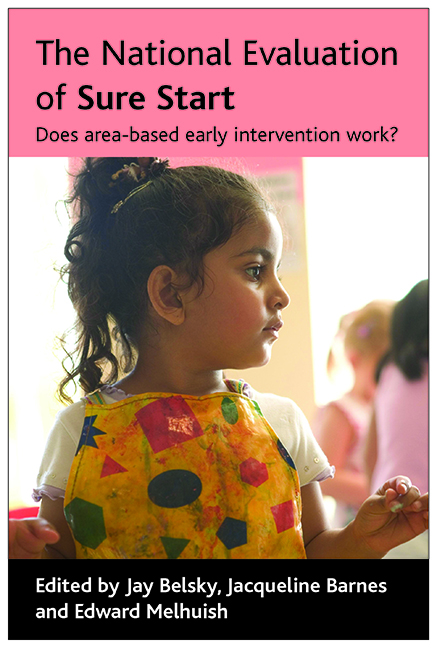Book contents
- Frontmatter
- Contents
- List of tables and figures
- Foreword
- List of abbreviations
- Notes on contributors
- Part One The historical and policy context
- Part Two The local context of Sure Start Local Programmes
- Part Three The implementation of Sure Start Local Programmes
- Part Four The impact of Sure Start Local Programmes
- Part Five Conclusion
- Index
nine - Variation in Sure Start Local Programmes: consequences for children and families
Published online by Cambridge University Press: 15 September 2022
- Frontmatter
- Contents
- List of tables and figures
- Foreword
- List of abbreviations
- Notes on contributors
- Part One The historical and policy context
- Part Two The local context of Sure Start Local Programmes
- Part Three The implementation of Sure Start Local Programmes
- Part Four The impact of Sure Start Local Programmes
- Part Five Conclusion
- Index
Summary
Sure Start Local Programmes (SSLPs) were true community interventions (see Barnes et al, 2006), in that all children under four and their families in an area were ‘targets’ of intervention. As discussed in Chapter One, community control was emphasised and was to be exercised through local partnership management boards. These boards brought together all stakeholders in the community concerned with children (that is, health services, social services, education, the private sector, the voluntary sector and parents). The placing of almost complete control with the community meant that there was very little specification of how to provide services, only what they should achieve. The programmes were to improve existing services and create new ones as needed, but there was no specification of how services were to be changed or what exactly was to be delivered – ends, not means. This is in marked contrast to focused early interventions that have been demonstrated to be effective, be they childcare based, like the Abecedarian Project (Ramey et al, 2000); home based, like the Prenatal Early Intervention Project (Olds et al, 1999); or the Positive Parenting Program (Sanders, 2003); or even a combination of centre and home based, like Early Head Start (Love et al, 2005).
While all communities selected were disadvantaged, such areas, including those selected for SSLPs, differed in important ways related to child and family well-being (Barnes et al, 2005). This area-level diversity is discussed in Chapter Two. Also, programmes’ local autonomy, together with their diverse history and service provision, as well as diversity among lead agencies and professionals, resulted in wide variation across the programmes in what they did, how they did it, and in their implementation proficiency, posing a challenge for evaluation.
The preceding chapter highlighted the limited, but significant, across-the-board effects of SSLPs on family functioning, after controlling for child, family and area characteristics. Recall that mothers of nine-month-olds living in SSLP areas reported less household chaos and mothers of three-year-olds showed greater parental acceptance when compared with families living in similar areas that were yet to receive a Sure Start programme. In these analyses it was clear that great variation existed in the degree to which various programmes benefited children and families.
- Type
- Chapter
- Information
- The National Evaluation of Sure StartDoes Area-Based Early Intervention Work?, pp. 155 - 172Publisher: Bristol University PressPrint publication year: 2007



